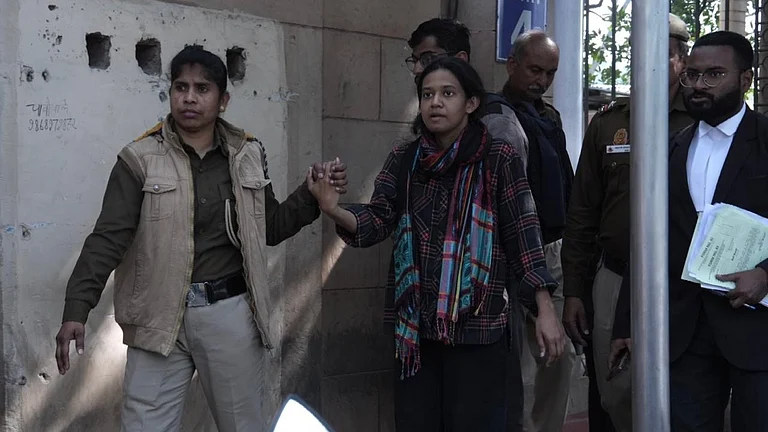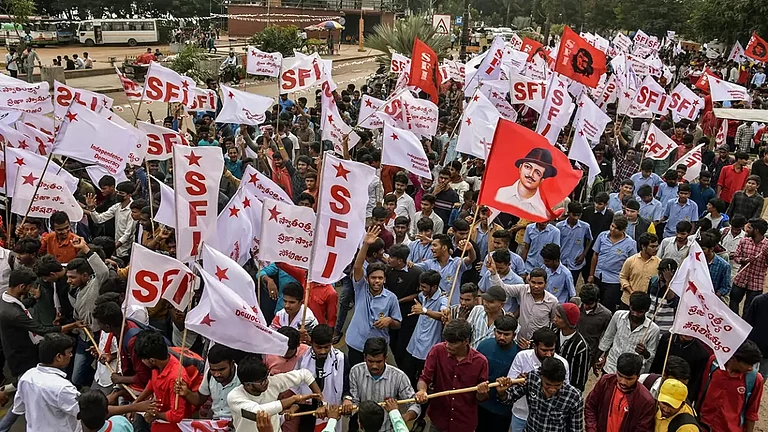When, on August 19, 2024, the news came that Comrade Sitaram Yechury was not well and had been admitted to AIIMS, his friends and comrades were confident that he will come out of there smiling, as he was a fighter. Some of us, who knew Comrade Sita from his JNU days, kept in touch with each other and were worried about his health. As the days went by we hoped against hope—in these politically dark times, we did not want to lose a strong and tall pillar of the INDIA alliance.
My first encounter with him goes back to the early 1970s when I was in studying in IIT-Delhi and was secretary of Students Federation of India (West UP). He, along with Comrade Suneet Chopra, came for a meeting of the SFI State Committee and spoke to us on "the revolutionary responsibility of SFI". All of us admired him for his clarity of thought, Marxist understanding, knowledge of various student movements across the world, idealism, and revolutionary zeal. I clearly remember that as the talk progressed, the distance between him and committee members faded away. By the end, he was a friend who was talking to us at a personal level instead of a Marxist intellectual from JNU.
Despite our efforts we could not create a unit of SFI in IIT-Delhi; therefore, a few Left-leaning friends regularly went from IIT to JNU to attend meetings and demonstrations and met SFI leaders there.
Post-Emergency, JNU was bubbling with political activities and the hope for a better future. Compared to that, IIT-Delhi was a very dry place. When the Delhi government declared an increase in DTC bus fares, CPI(M) and SFI decided to oppose it. It was decided that Sector-1, RK Puram and Boat Club would be the focal points to stop movement of buses. The demonstration continued from morning till late afternoon.
The police crackdown was intense; they attacked us with lathis and teargas shells. After the protest was over in the evening, JNUSU organised a meeting in the lawn next to the old JNU library. Comrade Sitaram was the first speaker: "My revolutionary salute to comrades who have faced the police brutality heroically," he said, addressing us. That was the first major protest led by him. Little did we know that this young student leader will rise to become the General Secretary of the Communist Party of India (Marxist) and occupy the position that was held by tall Marxists leaders like comrade P. Sundarayya, EMS Namboodiripad and Harkishan Singh Surjit, who played an important role in shaping the recent history of India.
Comrade Sita, as he was addressed by friends and comrades, rose in the party rapidly. He was elected All India President of SFI in 1984, became a member of the Central Committee of the CPI(M) in 1985, was inducted into the Central Secretariat of the party in 1989, and became a Polit Bureau member in 1992. This was the period when the Left movement in general, and CPI(M) in particular, was on the rise. It was also a period when Indian democracy was going through turmoil. Fascist Hindutva forces were also gaining ground. Comrade Sitaram, during this period and after the turn of the century, played a major role in shaping ideological and tactical positions both within and outside the party.
When he became member of Rajya Sabha in 2005, he relentlessly fought against any compromise with imperialism and Hindutva forces. Leaders of other parties always took him seriously because of his intellect, and clarity of thought and expression. He proved to be a fearless and uncompromising leader in Parliament as well.
Comrade Sita was also the editor of CPI(M) weekly, ‘People’s Democracy’ and proved to be a prolific writer who influenced and formulated the party’s position on all political and ideological issues. By 2014, it was quite clear that the CPI(M)'s historical mistakes had taken a heavy toll on the Left movement in India. The party progressively became weaker in West Bengal and Tripura. It had a profound impact on the Left and democratic forces in the country. A relentless fighter within the party, Comrade Sitaram led the CPI(M) to change its decision to maintain equidistance from Congress and Bhartiya Janta Party. In a cadre-based party which is full of idealists, bringing about a change even in tactical positions is not an easy task. After the demolition of the Babri mosque, many members of the party had realised how dangerous the rise of Hindutva forces could be; but majority still remembered the Emergency.
When Hindutva forces under the leadership Narendra Modi rose to power and a reign of terror was unleashed, Comrade Sitaram devoted his political acumen and all his energies to fight back. He led the party in formulating its future role—that of bringing all anti-fascist forces together. His deep understanding that the onslaught cannot be resisted without creating a broad coalition of all Left and democratic forces led him and CPI(M) to play an active role in bringing divergent political formations on to a single platform. As INDIA emerged, Comrade Sita played probably the most important role in rounding off the sharp corners of these divergent groups and some of the uncompromising leaders. He learnt to handle such situations from Comrade Harkishan Singh Surjit. The experience came handy as no other leader had that skill.
Whenever I either met him or heard his speeches I was reminded of the same young idealist, revolutionary, Marxist and very friendly comrade Sitaram that I knew from his JNU days. He had become a national leader yet he was the most accessible VIP. He was always a very bright student and could have chosen any profession to live a lavish and comfortable life. But his idealism led him to choose a path that was difficult. After finishing his studies, he joined a party which believes in a working class-led egalitarian society. The bright young student of JNU chose this path because he firmly believed in equality of human beings and dreamt of a socialist world where a miniscule set of human beings will not exploit the entire human race. Throughout his life, Comrade Yechury remained steadfast in his pursuit of a socialist India, inspiring generations of activists, intellectuals, and political leaders. His legacy will continue to guide the struggle for a just and equitable society.
Red Salute to Comrade Sitaram Yechury! Your unwavering dedication to the cause of the people will never be forgotten.
(Gauhar Raza is a scientist by profession. He is also a leading Urdu poet, social activist, and documentary filmmaker.)





















